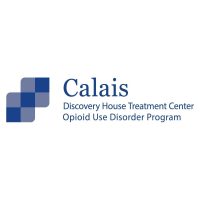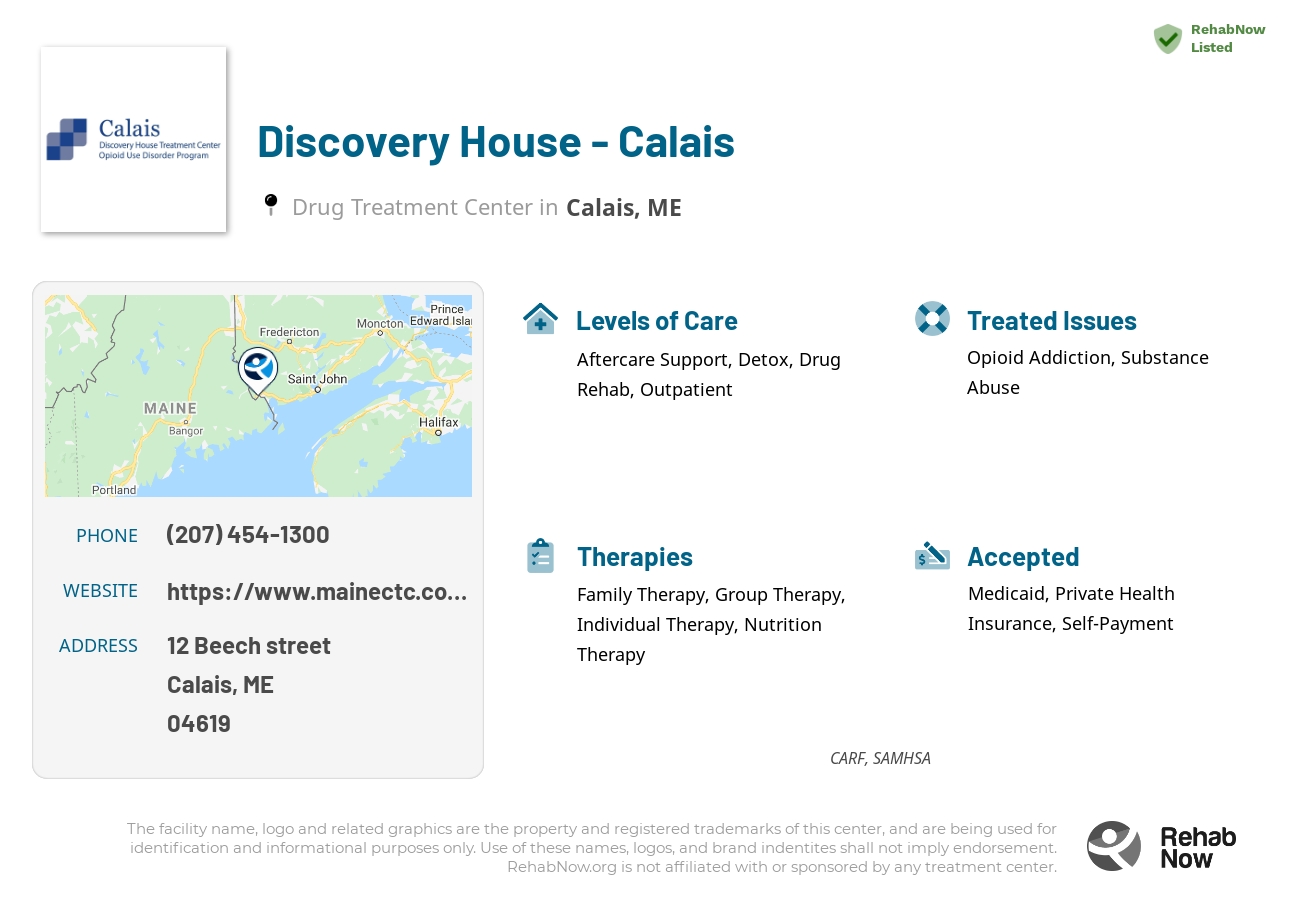About Discovery House - Calais in Maine
Discovery House is a provider of addiction and substance abuse treatment services in Calais, Maine. Combining a range of evidence-based care and clinical expertise, Discovery House is dedicated to providing an individualized and compassionate approach to opioid addiction recovery. Offering an array of services, Discovery House offers various levels of care that include Aftercare Support, Detox, Drug Rehab, and Outpatient.
Patients can receive personalized treatment for both opioid addiction and substance abuse, with a variety of methods and treatments that include Family Therapy, Group Therapy, Individual Therapy, Nutrition Therapy, Aftercare, Detox, Drug Rehab, Outpatient Treatment (OP), and Residential Long Term (>30 Days). Discovery House is also accredited by CARF, SAMHSA and accepts Private Health Insurance. With a commitment to providing comprehensive and comprehensive care, Discovery House is dedicated to helping individuals and families heal and recover from addiction and substance abuse.
Genders
Ages
Modality
Additional
Accreditations
SAMHSA

CARF
The Commission on Accreditation of Rehabilitation Facilities (CARF) is a non-profit organization that specifically accredits rehab organizations. Founded in 1966, CARF's, mission is to help service providers like rehab facilities maintain high standards of care.
Conditions and Issues Treated
Substance Abuse Treatment is important when getting sober, as it helps addicts learn the skills they need to live a clean life. There are many different kinds of recovery treatment, including but not limited to medication-assisted therapy, behavioral therapeutic approaches, self-help groups, and counseling. Each treatment has its benefits that help addicts recover.
Counseling can help addicts learn the skills they need to live sober lives. It can be used to treat underlying mental health issues, like depression or anxiety, that could lead to relapse. Counseling can also help people find work, deal with family problems, and learn to manage living without drugs.
With so many people addicted to opioids, we need to help those who want to quit. The cycle begins when opioid addicts take opioids for a painful injury. When someone starts taking their medication differently or in excess, it means they’re addicted and at risk of overdosing.
In , detoxing from these types of treatments is the most effective way to beat this. Most facilities begin with medical assistance and then provide counseling services; rehabilitation follows after successful treatment.
Levels of Care Offered
This center offers a variety of custom treatment tailored to individual recovery. Currently available are Aftercare Support, Detox, Drug Rehab, Outpatient, with additional therapies available as listed below.
Detox is an integral part of recovery and often very hard. Detoxification is the process of letting the body remove the drugs in it. It addresses the physical aspect of addiction. Detox from drugs can be unsafe as the patient undergoes withdrawal symptoms that range from headaches, vomiting, body aches to seizures and cardiac arrests. The main purpose of detox is to keep the drug users comfortable as the drugs leave their system.
Quitting cold turkey is not recommended and can lead to many issues. Detox is best done under medical supervision so that a team of experts can monitor the side effects and complications. Detox, alone, does not guarantee sobriety as the underlying psychological issues are not addressed.
Alcohol or drug addiction, or co-occurring disorders, are treated in an outpatient program. The patient must attend therapy and other programs at the facility but can return home each night.
Outpatient treatment allows recovering addicts to live at home while receiving addiction treatment. Outpatients can attend group sessions for a few hours per week. Outpatients may also continue to work full time and study/attend school without interruption if they choose.
The accomplishment of completing a drug or alcohol treatment program is just the first step. Once that is complete, aftercare support comes into play. This includes helping people adjust to life without substances outside of guidelines with assistance like getting sober living accommodations and career counseling and AA/NA programs for those who are struggling between sobriety or want continued help in maintaining it once they have completed their initial rehabilitation at an addiction facility.
Aftercare comprises services that help recovering addicts readjust to normal day-to-day activities while working on specific issues. These problems include psychiatric issues, family problems caused by substance abuse, continuing education pursuits if desired during rehab, etc. These can last up to one year+ depending on what’s needed most urgently upon completion of earlier stages.
Therapies & Programs
Different people react differently to various treatment options. Some drug rehabilitation centers offer individualized treatment that caters to the specific needs of a drug addict. The best treatment option varies on an individual depending on the type of drug abused, life history, medical condition of the person, social circumstances, and the environment they live in now.
When a person enters drug rehab, they usually have anti-drug associations such as withdrawal symptoms, stress, cravings, etc. The first step of drug rehab is to detoxify the body from any residual substances in it. Drug rehabilitation centers usually employ trained medical professionals to help in this process. Usually, the initial detoxification lasts for five days, where the person is monitored under close supervision.
Family therapy sessions typically involve the addict and their family members. During these sessions, a therapist will work with everyone involved to help them understand addiction and find healthy ways of coping without substance abuse.
Some addicts might feel embarrassed about their substance abuse problems. By encouraging family members to attend these sessions, therapists can show addicts that they’re not alone in dealing with addiction. Therapists can also work with family members to help them understand addiction and learn how to offer support and encouragement to their loved one as they deal with substance abuse issues.
Attending group therapy at Discovery House - Calais in , is a useful way for those seeking sobriety to realize they aren’t the only one going through it.
This is when a group of people on different recovery phases get together and talk about what they’re going through, their triggers, successes, and failures. This can include alternative types of therapies too! Group therapy may occur on an outpatient or inpatient basis with groups that have no pre-existing relationships outside the session, unlike support groups where everyone already knows each other beforehand.
Good nutrition can be difficult for people recovering from addiction because they may not feel like eating while they are experiencing the physical and emotional side effects of detoxing.
Nutrition therapy can help addicts in the following ways:
- Helps individuals to understand which foods promote good health and support recovery that will assist them during detox
- Provides guidance and education about how to maintain a nutritious diet so they can stay healthy during recovery
- Improves their overall health and well-being, which can reduce the severity of substance withdrawal symptoms.
Nicotine replacement therapy is a popular method of treatment that helps individuals overcome their addiction to cigarettes by providing them with safer alternatives. Nicotine replacement options can include:
- Inhalers
- Gum
- Patches
These treatments are often used in combination with other therapies, such as cognitive behavioral therapy or motivational interviewing, to help individuals more easily transition into a smoking-free lifestyle.
Payment Options Accepted
For specific insurance or payment methods please contact us.
Is your insurance accepted?
Ask an expert, call (888) 674-0062
Additional Details
Specifics, location, and helpful extra information.
Calais, Maine 4619 Phone Number(207) 454-1300 Meta DetailsUpdated November 25, 2023
Staff Verified
Discovery House - Calais Patient Reviews
There are no reviews yet. Be the first one to write one.
Calais, Maine Addiction Information
Prescription opioid abuse is the most common form of substance abuse in Maine. More than 10% of these residents have also admitted to using prescription drugs for non-medical purposes. Between 2013 and 2014, 4 out of every 5 deaths in Maine were caused by illicit drugs. One in five high school students in Maine uses marijuana every single month.
Calais, Maine, has a serious drug abuse problem. According to recent statistics, approximately 9 percent of the population in Calais abuse drugs. Drug addiction and abuse can harm the economy, leading to lost productivity and increased healthcare costs. Additionally, there are only a limited number of rehab centers in the area, making it difficult for those struggling with addiction to get the help they need.
Treatment in Nearby Cities
- Newport, ME (100.4 mi.)
- Orrington, ME (80.0 mi.)
- Portland, ME (180.4 mi.)
- Limestone, ME (122.4 mi.)
- Winterport, ME (84.9 mi.)
Centers near Discovery House - Calais
The facility name, logo and brand are the property and registered trademarks of Discovery House - Calais, and are being used for identification and informational purposes only. Use of these names, logos and brands shall not imply endorsement. RehabNow.org is not affiliated with or sponsored by Discovery House - Calais.




